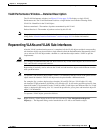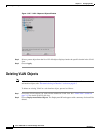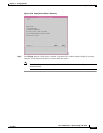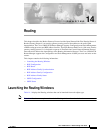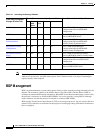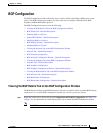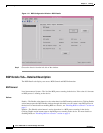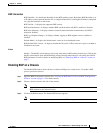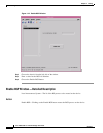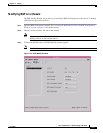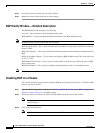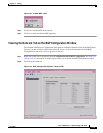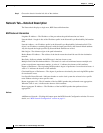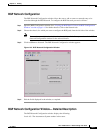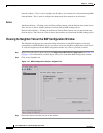
14-5
Cisco 12000/10700 v3.1.1 Router Manager User Guide
OL-4455-01
Chapter 14 Routing
BGP Configuration
BGP Information
BGP Identifier—It is the Router Identifier for the BGP speaking router. By default, BGP Identifier is set
to IP address of the loopback interface if it is configured otherwise it is the highest IP address configured
for a physical interface on that router.
BGP Version— It displays the supported BGP version.
BGP Synchronization—It displays whether BGP synchronization with IGP is enabled or disabled.
BGP Auto-Summary—It displays whether Automatic network number summarization for BGP is
enabled or disabled.
BGP Log Neighbor-Changes—It displays whether logging of BGP neighbor resets is enabled or
disabled.
Default-Metric—It displays the default-metric value set for redistributed routes.
BGP Default IPV4-Unicast—It displays whether the IP version 4 (IPv4) unicast for peers is enabled or
disabled on the router.
Action
Modify—The Modify action button is active only when there is BGP running in the device. Clicking the
Modify action button opens the BGP Modify window through which the user can modify the General
BGP parameters. For more details on modifying BGP, see “Modifying BGP on a Chassis” section on
page 7.
Enabling BGP on a Chassis
The Enable BGP window allows the user to enable a BGP process on the device. To enable a BGP
process, proceed as follows:
Step 1 Open the BGP Configuration window. See “Viewing the BGP Details Tab on the BGP Configuration
Window” section on page 14-3 for further details.
Step 2 Choose a chassis from the left side of the window.
Note You can choose multiple chassis (from the chassis list) which allows you to launch the Enable
BGP window for the selected chassis.
Step 3 Click on the Enable button. The Enable BGP window appears.
Note The Enable button is active only when there is no BGP running on the device.



